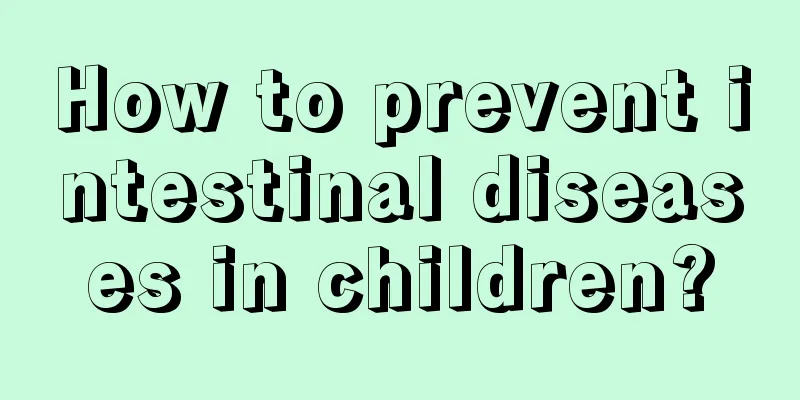What to do if your newborn baby has eczema

|
The skin of newborns is relatively delicate, and therefore, children are more susceptible to various skin diseases. Eczema is a particularly common skin disease in newborns. If a child suffers from eczema, he or she will have various uncomfortable symptoms such as itching. In order to alleviate this symptom and restore the baby's skin to health, parents must take certain measures to treat eczema and take certain care of the child's skin! 1. What to do if a newborn baby has eczema First of all, parents must do a good job of care to prevent their baby’s eczema from getting worse. Secondly, when choosing medicine, it is best to consult a doctor and choose medicine that does not contain hormones, is mild and has no side effects. Finally, you can apply cold and wet compresses to the baby's affected area to alleviate the condition. There are many kinds of medicines on the market for treating baby eczema, but most of the medicines that claim to be quick and effective contain hormones. Once the medicine is stopped, the baby's eczema may relapse and become very serious. However, the residues after long-term use can cause abnormal skin color, such as pale or even darkening. Therefore, parents need to choose hormone-free products for babies with eczema to prevent future problems. Among them, hormone-free products are further divided into pure Chinese medicine ingredients and plant ingredients. Do not choose blindly. In fact, Chinese medicine products contain complex ingredients, so they are suitable for older children and adults. 2. What to do if eczema appears on the newborn's face (1) Commonly used wet compresses are 1:10,000 potassium permanganate solution (be careful to make sure the potassium permanganate is completely dissolved, as undissolved potassium permanganate will burn the baby's skin). This not only cleans the wound surface, but also has a bactericidal, astringent and oxidative effect. (2) 4-6 layers of fine gauze, not dripping water, are applied to the wound surface with wet gauze. The time and frequency of replacement are determined according to the amount of exudate from the eczema. When the exudate absorbed by the gauze reaches half saturation, the gauze should be replaced. Two to three times daily. When there is a lot of exudate, the dressing should be changed more frequently during wet compresses to avoid leaving the dressing soaked with exudate on the wound for a long time, which will irritate the surrounding normal skin and cause the wound to expand. (3) For large-area eczema, proper attention should be paid to the nature, concentration and size of the compress area of the drug. (4) If the redness and swelling of the wound gradually subside, the exudate decreases, and the wound is dry, you can stop applying wet compresses and use paste instead. (5) Please note when applying cold wet compress: the wet compress area should not exceed 1/3 of the body area to avoid excessive evaporation from the body surface causing dehydration in the baby. 3. Prevention methods of neonatal eczema 1. Breastfeeding Eczema can be prevented to a certain extent. For babies with a family history of allergic diseases, breastfeeding should be chosen as much as possible and the feeding time should be prolonged as much as possible. During breastfeeding, mothers should try to avoid allergenic foods and insist on calcium supplementation. If artificial feeding is chosen, try to choose low-allergenic formula milk from the beginning. 2. Pay attention to care (1) Daily care: The room should be ventilated frequently to keep the indoor air fresh. (2) Baby’s clothing: Children’s clothes and blankets should be as breathable, soft, and made of pure cotton or fine fabrics as possible. Do not wear chemical fiber fabrics. Avoid wool fabrics and knitted clothes for both inner and outer clothing. It is best to wear cotton padded jackets, cotton-padded jackets, flannel shirts, etc. (3) Daily hygiene: Bathe regularly with clean water, and try not to use bath and skin care products containing chemicals; maintain smooth bowel movements, get enough sleep, do massage or baby exercises every day to exercise the baby's gastrointestinal function and enhance the body's anti-allergic ability. |
<<: What ointment should be used for newborn eczema
>>: Baby has eye bags and dark circles
Recommend
There are 8 quick remedies for toothache in children
As the old saying goes, toothache is not a diseas...
The child suddenly stopped talking
Many parents will find that their originally live...
My child is coughing after getting the chickenpox vaccine
Coughing is a common thing nowadays, especially a...
The reason why a 2-year-old baby grinds his teeth at night
The baby's body is very fragile, and may have...
What are the symptoms of gastrointestinal bleeding in babies?
For babies or infants, incomplete development of ...
What should I do if my child has difficulty taking medicine?
Children's bodies are still developing, and t...
How to deal with itchy nose in children
What are the measures to deal with children's...
Treatment of asthmatic bronchitis in children
Many people are filled with fear about allergic b...
What causes a tickle in my child's throat?
Throat itching and coughing is a very common dise...
Treatment for short sleep time in newborns
Children’s physical condition is getting worse da...
How long does it take for children's myositis to recover?
Myositis is a disease that children are very like...
Things to note after your baby is one month old
Nowadays, many families choose to have only one c...
What are the symptoms of mentally retarded children?
Intellectual disability is not a good word, it me...
Five physical methods of reducing fever in children without side effects
It is a common phenomenon for children to have a ...
What medicine should children take if they have worms in their stomach?
Nowadays, the living and sanitary environments ha...









